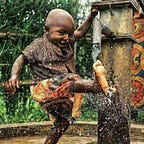Review of Chronicles from the land of the happiest people on earth — Exposé on Nigeria’s history that comes off too academic
Wole Soyinka’s “Chronicles” is a tale that attempts to serve as political satire, murder mystery, conspiracy tale and a general lament on the state of nation. The plot centers itself on a disturbing business that trades human body parts for use in rituals and superstitions. As outlandish as this tale, its fictional premise lies close to the truth. The belief in human body parts having magical properties that can create power, business success, wealth has led to ritual killings in Nigeria being a commonplace.
Soyinka’s Chronicles has an interesting premise, as you would expect from the veteran author. Soyinka tells the tale loosely from the perspective of two people from a four friend group, centering on Pitan Payne, Menka. There are callbacks in this book that serve as little Soyinka nuggets, the consistency in referring to Menka as the “man from Gimchi” just as Soyinka is the “Man from Abeokuta”. There are also similarities you suspect between Prince Badetona’s torture in his unlawful detainment and Wole Soyinka’s unlawful detainment in the last military regime.
The book is written in quite similar style of African literature in the late 20th century. The stories are focused on socio-political themes and state of the nation. It is reminiscent of Achebe’s Anthills of Savanah, Arrow of God, Ngugi Wa Thiongó’s A grain of wheat. The plot is quite convoluted, as it tries to uncover the elements of the human part business — Human Resources, as it is called — and how much it is enabled by the current ruling government and clergy class.
Soyinka presents the plot as an intellectual discourse, difficult to read for someone not familiar with Nigeria’s politics or socio-economic history with multiple references or inferences needed. “Chronicles” ties itself in knots in trying to provide ample context behind character’s motivations, but makes little to no effort to humanize or make them seem relatable to the reader. “Chronicles” is needlessly verbose. A good summary of grammatical choices of the book is when it calls a naming ceremony, a nomenclatural celebration.This repeats across every page of the 509 paged book. Choice of grammar makes it difficult to connect with, as the reading seems more of an intellectual exercise than reading a tale.
There is so much going on in the book, there is a story, a collection of critiques on the spirit of the nation, exposés on institutional support feeding the human organ market. It launches into essays seemingly in the middle of the story on random concepts — a good example is a satirical critique of game shows right in the middle of the tale of the charlatan religious personnel — making it challenging to follow the book. Nevertheless, Soyinka is clearly whistleblowing on the inner workings of the country, thirty years ago. Soyinka’s choice of time, clear markers on character’s eccentricities, makes it easy for a knowledgeable Nigerian to see who characters are based on.
Soyinka’s book is always going to be a hallmark of our literature. Twenty years from now, just like books like Adichie’s Half of a yellow sun, Achebe’s There was a country, pushed a generation of people towards trying to understand Nigeria’s civil war, “Chronicles” could push people towards understanding the last military presidency and all it took from us as a nation.
“Chronicles” is definitely not Soyinka’s magnum opus, but a decent copy on how fiction provides an outlet to tell real and often gruesome stories, in this case detailing a human parts market, enabled by a people’s government and relgion. While the intellectual aspect of how the book is captured makes it hard to read, it is ultimately a labor of love from one of Nigeria’s most revered literary mind.
Rating 2.5/5
P.S. If you enjoyed this review, you might also enjoy a review of Chimeka Garricks “A broken people’s playlist”
